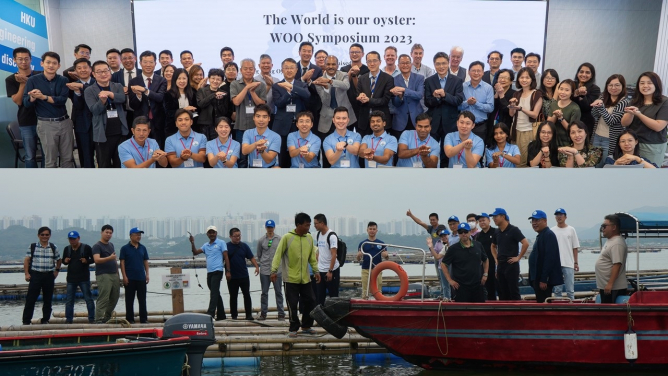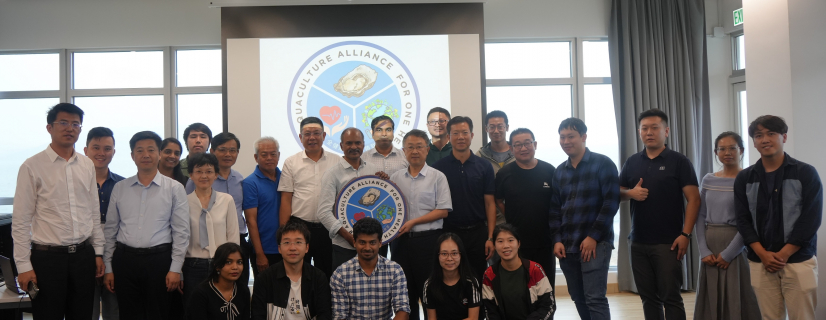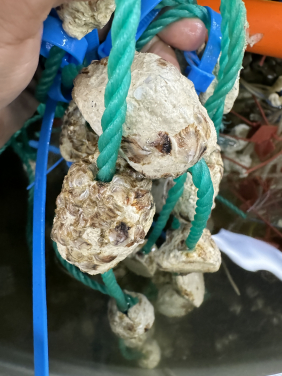Media
Establishment of Oyster Aquaculture Alliance for One Health:
Amplifying the Impact of Hong Kong Oyster Hatchery and Breeding Technology in China
21 Nov 2023

Upper image: The participants of ‘The World is Our Oyster’ Symposium gathered for a group photo, creatively mimicking oyster shells with their hands.
Lower image: The participants of WOO-2023 engaged in discussion and brainstormed ideas for promoting one health oyster aquaculture while standing on the HKU’s oyster culture raft in Lau Fau Shan.

Dr Thiyagarajan VENGATESEN of HKU School of Biological Sciences and The Swire Institute of Marine Science provided an introduction of Hong Kong Oyster Hatchery and its research impacts to symposium audience in the opening session.

Professor Qiang ZHOU, Dean of HKU Science, recognised the importance of Oyster Aquaculture Alliance (OAA) and unveiled its logo during the WOO-2023.

The Participants of WOO-2023 Symposium concluded the mission and vision of Oyster Aquaculture Alliance (OAA) at the Swire Institute of Marine Science.

Upper image: The participants of ‘The World is Our Oyster’ Symposium gathered for a group photo, creatively mimicking oyster shells with their hands.
Lower image: The participants of WOO-2023 engaged in discussion and brainstormed ideas for promoting one health oyster aquaculture while standing on the HKU’s oyster culture raft in Lau Fau Shan.
- 1 / 6
- 2 / 6
- 3 / 6
- 4 / 6
- 5 / 6
- 6 / 6
On October 27-29, the Hong Kong Oyster Hatchery and Innovation Research Unit (HKO-HIRU) at The University of Hong Kong (HKU) successfully hosted the ‘The World is Our Oyster (WOO) Symposium 2023’. During the event, the Oyster Aquaculture Alliance for One Health (OAA) was officially established. The event brought together a diverse group of over 50 stakeholders, including scientists, policymakers, government officials, oyster growers, industrial partners, and research students, sharing their groundbreaking research findings and fostering discussions on the future of ONE HEALTH oyster aquaculture in Hong Kong, as well as the rebranding of Hong Kong Oysters. The symposium exemplified the spirit of partnership between HKU School of Biological Sciences, the Swire Institute of Marine Science (SWIMS), and the local oyster industry in nurturing the growth of HKO-HIRU.
The call for modernising oyster aquaculture and knowledge exchange
Cultivation of Hong Kong (HK) oyster species in southern China contributes to a quarter of global edible oyster production. HK oysters are a nutritious delicacy rich in Omega-3 and are primarily consumed by the rising middle-class populations. Hence, sustained expansion of this sector is essential for seafood security. However, this sector faces unprecedented challenges due to reclamation, overcrowding and climate change. These human impacts not only directly deteriorate oyster food safety and security but also seriously affect wild seed production. The few wild seeds that are collected often suffer from mass mortality during the harvesting period in winter, and once these seeds are planted or used, their performance is often unpredictable. Thus, sustainable aquaculture in the region now heavily depends on hatchery-produced seeds from stress-tolerant and disease-resilient populations, especially their triploid version; and on how quickly we adapt the one health approach in aquaculture. As part of the effort, the HKSAR government has funded HKU via the Sustainable Fisheries Development Fund (SFDF) to establish a research-based hatchery HKO-HIRU, for developing novel technology to modernise the sector with knowledge exchange — the project has developed impactful technologies in collaboration with growers in South China and Lee Kum Kee Co. Ltd.
Breakthroughs and teamwork for a thriving oyster farming industry
The hatchery at HKU has successfully produced and delivered over 5,000 strings of seeds to the local oyster growers in Lau Fau Shan (LFS). The hatchery has also achieved a milestone by producing its first batch of triploid oyster seeds this season. The performance of these triploid seeds is currently being monitored.
Triploid oysters, containing three sets of chromosomes instead of two, exhibits resilience to environmental stressors such as climate change, pH fluctuations and salinity. Local production of triploid oyster seeds in Hong Kong has the potential to enhance local oyster aquaculture. Other than this, the hatchery has also completed the first trial batch of single oyster spat production using in-house upwelling and downwelling systems in collaboration with the Department of Architecture at HKU. The hatchery has also co-developed innovative material with HKU’s Civil Engineering Department to improve oyster spat recruitment. Additionally, the research unit is currently working on the development of a Single Nucleotide Polymorphism (SNP) chip for broodstock management at the hatchery.
WOO Symposium 2023: Unleashing Innovation and Celebrating Collaborative Power
In the Grand Opening of the 3-day event, Professor Alice WONG, Associate Vice-President (Research) of HKU and the interim Director of the School of Biological Sciences, delivered an opening address emphasising the significance of innovative technologies for modernising oyster aquaculture. She also highlighted the importance of collaboration among researchers, government, growers and industry for effective knowledge exchange in this aquaculture sector. During the logo unveiling of the alliance, Dean of HKU Science Professor Qiang ZHOU expressed appreciation for the initiative and efforts made by OAA. Additionally, we were honoured to have the presence of Mr Yinghua LI, Deputy Mayor of the Rushan City Government.
Mr Patrick LAI, Assistant Director (Fisheries & Marine Conservation) of Agriculture, Fisheries and Conservation Department (AFCD), expressed appreciation for the progress made by HKO-HIRU in setting up the hatchery at HKU and the on-time delivery of oyster seeds to the growers in Lau Fau Shan. He mentioned that more support could be provided through SFDF in the coming years. Mr Benjamin LEE, President of Hong Kong Oyster Culture Association and Chairman of STK Rural committee, showed his interest in learning about hatchery technology from HKU to incorporate oyster aquaculture potentially in Sha Tau Kok area. Echoing with all the leaders and experts, Professor Qi LI, President of Oyster Aquaculture Association of China, stressed the importance of gathering professionals from the industry and establishing the alliance at HKU. The opening was concluded by the visit of the state-of-the-art oyster hatchery facility at the campus.
A full-day symposium was hosted at HKU’s off-campus research facility, the Swire Institute of Marine Science (SWIMS), on the second day, where scientists and policymakers discussed the sustainable future of Oyster aquaculture. The participants explored the possibility of making an SNP chip for multiple oyster species to aid in broodstock management at the hatchery. They were also provided with the research findings presented by researchers of HKU on the winter mortality of oysters in Hong Kong, along with very valuable insights shared by Rushan city Deputy Mayor and his delegation on the possibility of adapting science-based planning in the oyster aquaculture industry in Hong Kong and mainland, including considerations for respective rebranding. Striving to ‘improve oyster aquaculture environment, species and culturing protocols with one health practices as an innovative solution to enhance the commercial value of Chinese oyster products’, the participants reaffirmed their commitment to the mission of OAA.
On the final day of the symposium, the group visited the HKU-AFCD oyster rafts in LFS where the HKO-HIRU-produced seeds are currently deployed and being monitored. The visit provided a unique opportunity for oyster growers to voice their concerns, while representatives from the Deep Bay Oyster Cultivator Association engaged in a collaborative discussion with AFCD representatives and scientists on how to improve the quality and market value of Hong Kong oysters. This engaging exchange of ideas and perspectives was a testament to the symposium's success in fostering a comprehensive and inclusive dialogue among all stakeholders within the ONE HEALTH oyster aquaculture industry.
Dr Thiyagarajan VENGATESEN from HKU School of Biological Sciences and The Swire Institute of Marine Science, who is also the Director of HKO-HIRU and the organiser of WOO-2023 Symposium, expressed his satisfaction with the outcome of this meeting. ‘The meeting has demonstrated the breeding technologies that have been developed in the HKO-HIRU to various stakeholders, identifying ways through which those technologies could be integrated with national efforts to develop sustainable oyster aquaculture for one health with global perspective; and finalising the objectives and deliverables of the just launched ‘Oyster Aquaculture Alliance for One Health’, said Dr Vengatesen.
For more information, please visit the website of HKO-HIRU: https://www.hkuoyster.com/
Images download and captions: https://www.scifac.hku.hk/press
For media enquiries, please contact Ms Casey To, External Relations Officer (tel: 3917 4948; email: caseyto@hku.hk / Ms Cindy Chan, Assistant Director of Communications of HKU, Faculty of Science (tel: 39175286; email: cindycst@hku.hk).


